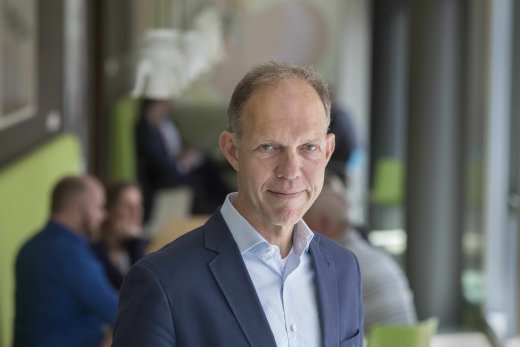21/12/2016
SensUs Interviews: Floris Italianer
For our first edition of SensUs interviews for SensUs 2017, we spoke with Floris Italianer, the CEO of the Dutch Heart Foundation. The goal of SensUs 2017 is to make working prototypes to detect heart failure. We spoke with Floris Italianer about the benefits of future biosensors for patients and about research supported by the Dutch Heart Foundation.
Can you tell something about yourself, and about your role as director of the Heart Foundation?
FI: Before joining the Dutch Heart Foundation, three years ago, I have been working in the healthcare industry for ten years. Originally, as a CEO of a private eye laser clinic, later on in advising and financing roles for smaller Dutch hospitals and finally, as CEO of a public foundation that was responsible for the financing system for hospitals in The Netherlands. Those experiences in private and public healthcare, combined with my background in private industry, help me tremendously in my work for the Dutch Heart Foundation. Within the Dutch Heart Foundation we combine marketing, science and advocacy. Consequently, a background in these areas helps a lot.
Why do you like working in the medical sector?
FI: It is much broader than the medical sector. For instance, we are also involved in health programs in schools and in various anti-tobacco programs. Health encompasses all people on this planet. That is why our work is so relevant and interesting. I am also board member of the European Heart Network and of the World Heart Federation. Globally, 17 mln people and in Europe, 4 mln people die of cardiovascular disease, every year. These numbers are growing every year, so measures are severely needed to stop this threat. It is a privilege to be able to contribute to this fight.
How are you involved with TU Eindhoven?
FI: I have been asked to join the Advisory Board of the Strategic Area Health of TU/e. For me it is important to stay in touch with the academic world and to stay involved in the plans and activities of universities such as the TU/e. It is very inspiring to be among people with different backgrounds, such as from the insurance world and from Philips and to discuss how academic work translates in applications and solutions in healthcare.
Might patients benefit from biosensing in the future?
FI: Technology opens new roads to monitoring and curing patients and should be explored as much as possible. Equally important is to innovate in how different healthcare providers cooperate and exchange patient information for the benefit of the patient and for scientists to exchange scientific data. For these developments, smart and experienced people need to sit and work together. The center point should be the patient, for which reason we are involved in many of these discussions.
How is the Heart Foundation involved in research?
FI: The biggest part of our spending is in research. Since 2011, we have committed almost 100 mln euro in research. This is between 10-20% of all research spend in cardiovascular diseases, in The Netherlands. In addition to large, multi-university consortia, we provide grants for individual talented researchers. This year, we have developed a crowdfunding platform for innovation, where young researchers and the Dutch Heart Foundation jointly attract financing for research. If a researcher gets 25.000 euro financed through this platform, the Dutch Heart Foundation doubles it. This proves to be very successful. To read more about the subsidies click here.
What do you think of the SensUs concept and vision?
The Dutch Heart Foundation wants to realise scientific breakthroughs that society needs and that will have a major impact on the lives of patients with cardiovascular problems and their loved ones. We strongly believe in using the creative and innovative power of multidisciplinary student teams to develop new technological solutions for preventing and curing cardiovascular diseases. Therefore we are establishing different forms of collaboration with the TU/e. In 2014, together with scientists, patients, care providers, donors and volunteers, we set our research agenda for the coming years. Earlier recognition of cardiovascular disease is top priority on this list. We strongly believe biomarkers can play an important role in identifying cardiovascular health risks at an earlier stage as well as in treatment of cardiovascular diseases.
Hence, we are looking forward to the results of this initiative.
The teams of SensUs 2017 will build biosensor prototypes that can detect NT-proBNP in blood. Can you explain how heart patients can benefit from these biosensors?
NT-proBNP is a marker for damage of the heart muscle. In combination with other tests, it is used for the diagnosis of heart failure. It is also used to monitor disease progression and effect of therapy. There are about 142.000 patients with heart failure in the Netherlands. Cardiologists, GPs and specialised nurses are working together in the care for these patients. A validated NT-proBNP point-of-care biosensor that would make the testing of this marker faster, more efficient, more accurate, less complicated or require less blood could improve care for heart failure patients. It would for example mean that they would have to go to hospital less often, that they don’t have to wait long for the results of the test and that their treatment could be adjusted more precisely. Overall, it would make the burden of the disease a little less and it would allow patients to better live the life they want. And this is what the Hartstichting and the Hart&Vaatgroep are working for.

Facebook
YouTube
LinkedIn
Instagram